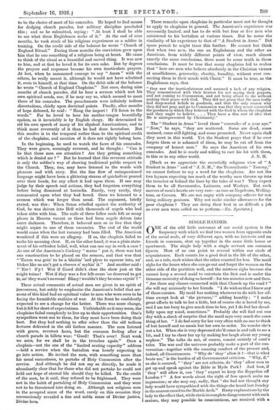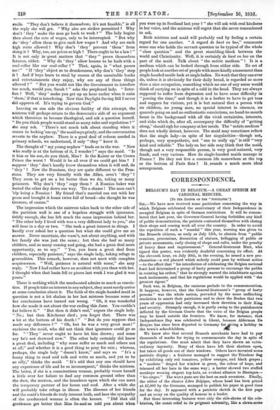SINGLE-HANDED.
NE of the odd little outcomes of our social system is the
frequency with which we find two women from opposite ends of the social scale, of very different ages, with no interests and no friends in common, shut up together in the same little house or apartment. The single lady with a single servant are common figures. Most of us etin point to several within our circle of acquaintance. Each counts for a good deal in the life of the other, and, as a rule, each wishes that the other counted for less. The maid sighs for the hours when she can go out and forget the woman on the other side of the partition wall, and the mistress sighs because she cannot keep a second maid to entertain the first and is under the tiresome necessity of doing so herself—for ten minutes now and then. " Are there any classes connected with that Church up the road ? " she will say anxiously to her friends. " I do wish so that I knew any of those curates. My maid has nothing whatever to do with her off- time except look at ' the pictures,' " adding humbly : " I make great efforts to talk to her a little, but of course she is bored by me, and I am too busy to give much time to her, yet I do feel her dread- fully upon my mind, sometimes." Probably she will find out one day with a shock of surprise that the maid says very much the same thing of her. " I do feel sorry for her very often with no one to think of but herself and no meals but her own to order. No wonder she's out a lot. When she is very depressed she'll come in and talk to me a bit, and I try to cheer her up by making her laugh about my young nephew." The talks do not, of course, consist entirely of aunt's tales. The war and the universe probably make a part of the con- versation—together with the amazing conduct of the present and,
indeed, all Governments. " Why do ' they' allow it 1—that is what beats me," is the burden of all Governmental criticism. " Why, if," as she is assured, " ' they' are not atheists, do ' they' allow men to get up and speak against the Bible in Hyde Park? And how, if ' they' will allow it, can ' they' expect to keep the Zeppelins off London ? " A few words about the right of free speech make no impression ; or she may say, sadly, that " she had not thought any lady would have sympathized with the things she heard last Sunday in the nearest crowd to the Marble Arch." Hasty explanations by the
lady to the effect that, while she is in complete disagreement with such orators, they may possibly be conscientious, are received with a smile. "They don't believe it themselves; it's not feasible," is all the reply she will get. " Why also are strikes permitted ? Why don't ' they' make the men go back to work ? " The lady begins then about the rate of wages, only to be interrupted. " But why do ' they' allow them to give such low wages ? And why are such high rents allowed ? Why don't ' they' prevent ' them' from doing it ? Why, too, are prices so high ? There ought to be a law ! " It is not only ink,great matters that " they " prove themselves fatuous, either. " Why do ' they' allow houses to be built with a coal-cellar like our coal-cellar ? " That, again, is " what passes me ! " "If ' they ' object so to drunkenness, why don't `they' stop it ? And if boys learn to steal by reason of the unsuitable books and entertainments they enjoy, why are any of these things allowed ? " " But you would not like the Government to interfere too much, would you, Sarah ? " asks the perplexed lady. " Inter- fere ? Well, ' they' make you get up an hour earlier when it suits them,' if that is interfering. Now that Daylight Saving Bill I never did approve of. It's trying to govern God."
Leaving on one side the obvious futility of this attempt, the mistress will perhaps return to the democratic side of an argument which threatens to become theological, and ask a question herself. " Do you think people would stand so many rules and regulations ? " she may ask. " There's not much talk about standing when it comes to locking 'em up," the maid says grimly, and the conversation reverts to the nephew. There is a good deal of reform needed in primary schools, we understand, if only " they " knew it.
The thought of " my young nephew " leads on to the war. " Now who really is at the bottom of it, I wonder ? " says the maid. "Is it him or his son, do you think, Miss ? Is the Kaiser or the Crown Prince the worst ? Would it be all over if we could get him ? I suppose ' they' don't hardly know themselves when it will end, do they ' ? Now the Russians, they are quite different to the Prus- sian& They are very friendly with the Allies, aren't ' they' ? They seem to get on a lot better than we do, taking so many prisoners. Why don't they ' copy them ? A Russian baker was looted the other day down our way. 'Tis a shame ! The man can't 'elp being a Russian ! My friend that's married ran out with her pram and brought it home twice full of bread—she thought he was German, of course."
The impression which the mistress takes back to the other side of the partition wall is one of a hopeless struggle with ignorance. Oddly enough, she has left much the same impression behind her. " The other lady I lived with was a very different lady to you," she will hear in a day or two. " She took a great interest in things. I hardly ever asked her a question but what she could give me an answer. Never uncertain, she wasn't, not about anything, and with her family she was just the same; but then she had' so many children, and so many coming and going, she had a great deal more opportunity, so to say." " Yes, you learn a great deal from children, especially patience," says the single lady, taking refuge in generalities. This remark, however, does not meet with complete acquiescence. " Well, patience is natural with some," she may reply. " Now I had rather have an accident with you than with her. I thought when that basin fell to pieces last week I was glad it was yours."
There is nothing which the uneducated admire so much as convic- tion. If people take an interest in any subject, they must surely arrive at some conclusion about it. The faith of the single-handed maid in question is not a bit shaken in her last mistress because some of her conclusions have turned out wrong. " Oh, it was wonderful how she made it out about the war ending this June. You couldn't but believe it." "But then it didn't end," argues the single lady. " No ; but then Kitchener died ; you forget that. There was a lot at the bottom of his death ! " " But do you suppose that made any difference ? " " Oh, but he was a very great man!" exclaims the maid, who did not think that ignorance could go so far. " ' They ' never ought to have let him drown ; and some say he's not drowned now." The other lady certainly did know a great deal, including " why some suffer so much and others not at all," and whether it is a good thing to pray for rain ; whereas, perhaps, the single lady " doesn't know," and says so. " It's a funny thing to read and talk and write so much, and yet to be so silly," thinks the maid. " It's odd that any one should have any experience of life and be so inconsequent," thinks the mistress. The latter, if she is a conscientious woman, probably vexes herself a little over her failure to find any common ground other than the dust, the mutton, and the laundress upon which she can meet the temporary partner of her house and roof. After a while she will probably take refuge in illness. The illnesses of her friends and the maid's friends do truly interest both, and here the sympathy of the uneducated woman is often the keener. " Did that old gentleman get better that Miss So-and-so told you about when
you were up in Scotland last year ? " she will ask with real kindness in her voice, and the mistress will regret that she never remembered to ask.
Both mistress and maid will probably end by feeling a certain regard for one another. " A regard de lutut en bas," comments some one who holds the servant question to be typical of the whole " class question" and the great stumbling-block between the world and Christianity. Well, it is certainly de haul en btu on the part of the maid. Talk about " the satiric medium " ! It is a medium which can be looked through from either side. No set of people look at another set of people with more kindly amusement than single-handed maids look at single ladies. No work that they can ever do, unless it is obviously for their daily bread, is regarded as more than a nice occupation, something which no one of any sense would think of carrying on in spite of a cold in the head. They are always supposed to suffer from depression and to have some difficulty in " passing the time," and though it is a bother to have to get teas and suppers for visitors, yet it is but natural that a person with no children, no young man, no special interest in cinemas, no quarrels going on and no enthusiastic convictions, no hand-to-mouth home in the background with all the vivid certainties, interests, and risks which do, after all, accompany the difficulty of "getting along," should sigh for company at her meals. The " satiric medium" does not wholly distort, however. The maid may sometimes reflect that the single lady—in spite of her singularities—though not, perhaps, very sympathetic, not "one to unify up," is still "very kind and reliable." The lady on her side may think that the maid, though not a very responsible person, is very good-natured, very frank, and very various. How do single-handed maids manage in France ? Do they not live a common life somewhere at the top or the bottom of Paris flats ? It sounds a much more ideal arrangement.































 Previous page
Previous page